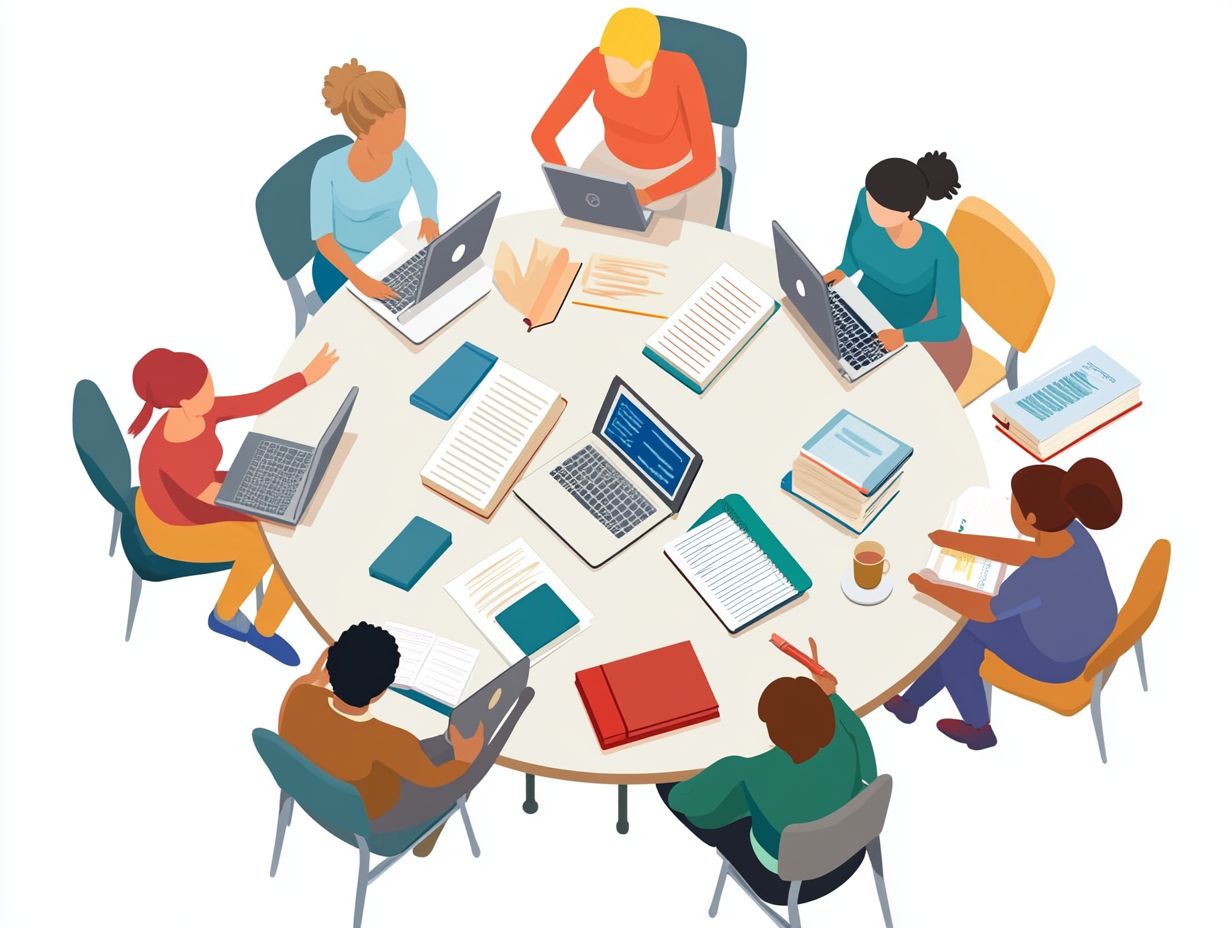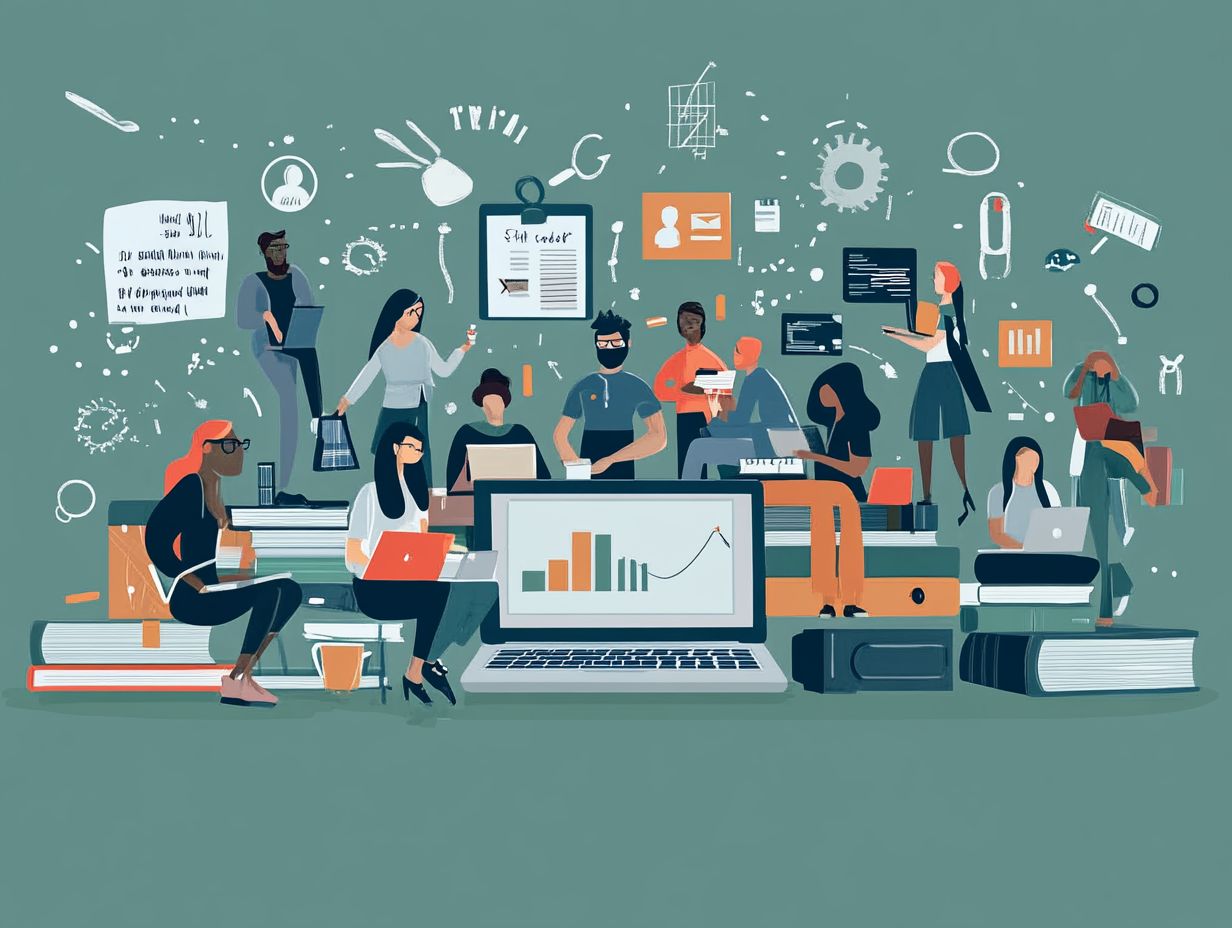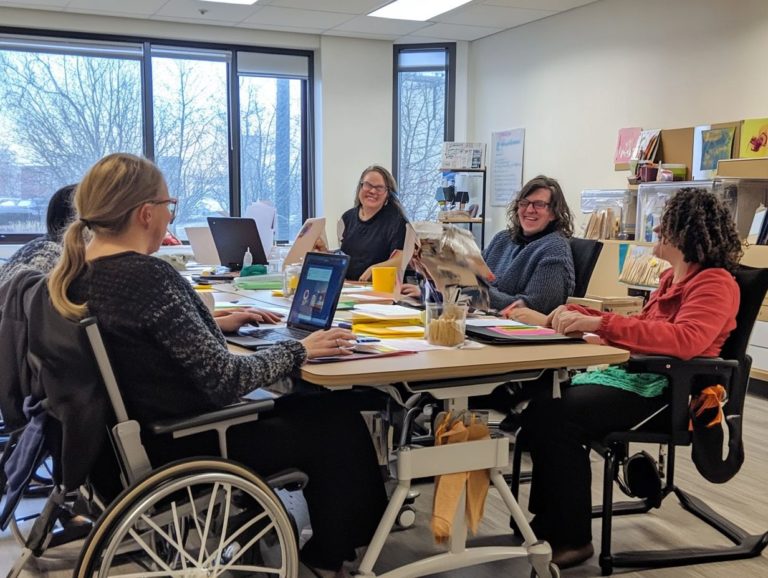The Benefits of Continuous Skill Development
In today s fast-paced world, the necessity for continuous skill development has reached unprecedented levels. As industries transform and technology marches forward, your ability to adapt and refine your skills becomes essential for both personal and professional growth.
This article delves into the essence of continuous skill development, emphasizing its significance not only for individuals like you aiming for career advancement but also for organizations striving to cultivate a culture of innovation.
You ll discover effective strategies, ranging from structured training programs to informal learning opportunities, along with practical tips to make your skill development journey both impactful and fulfilling.
Contents
Key Takeaways:

- Continuous skill development is the ongoing process of improving one’s skills and knowledge through formal and informal learning opportunities.
- For individuals, continuous skill development can lead to personal growth, increased job satisfaction, and career advancement. For organizations, it can result in a more skilled and competitive workforce.
- Ways to continuously develop skills include participating in formal training programs and taking advantage of informal learning opportunities. Effective continuous skill development also involves setting goals, tracking progress, and seeking feedback.
Understanding Continuous Skill Development
Recognizing the importance of continuous skill development is vital for your success! In today s fast-paced job market, industry trends and employer expectations are in a constant state of flux.
This journey isn t just about learning new skills; it s about adopting a positive attitude towards learning and improving that nurtures a culture of lifelong learning.
Both organizations and individuals are increasingly prioritizing professional development through a variety of training programs, mentorship opportunities, and advanced certifications. This proactive approach not only bridges the lack of necessary skills but also enhances employee engagement.
In this landscape, honing effective communication and cognitive skills becomes essential for your personal development and career progression.
Defining the Concept
The concept of continuous skill development is an all-encompassing journey that includes continuous learning, learning new skills, and professional growth. It centers on acquiring specialized skills that are vital in today s competitive job market.
This ongoing process weaves together various learning modes, allowing you to remain relevant, adapt to shifting industry demands, and elevate your career trajectory.
Key elements, like skill acquisition, involve blending theoretical knowledge with practical application, giving you the power to navigate the complexities in your field.
With a wealth of online resources at your fingertips think e-learning platforms and educational webinars you can enhance your expertise at your own pace.
Training programs, whether traditional or virtual, further cement these skills, fostering both adaptability and innovation. These elements are crucial for achieving sustained success in your career.
Why Continuous Skill Development is Important
Continuous skill development is essential for you, whether you’re an individual or part of an organization. Understanding the importance of continuous learning brings a wealth of benefits that can elevate job satisfaction, boost performance, and propel overall career growth.
By participating in lifelong learning initiatives, you cultivate a sense of fulfillment that positively impacts your retention and enhances your adaptability to shifting market demands.
For organizations that prioritize skill development, the rewards are manifold; they not only refine their recruitment strategies but also foster a more engaged workforce, fully equipped to meet the ever-evolving expectations of the industry.
Start your learning journey today to stay ahead!
Benefits for Individuals

For you, the benefits of continuous corporate training are vast and significantly influence your career success. Engaging in ongoing learning enhances your personal growth and equips you with the skills necessary to excel in a competitive job market.
By leveraging effective feedback mechanisms and networking opportunities, you can pinpoint your strengths and identify areas for improvement. This enables you to adapt seamlessly to industry trends.
Imagine unlocking new career pathways through skill development! With a commitment to lifelong learning, you can foster resilience and adaptability in an ever-evolving landscape. This proactive approach boosts your confidence and allows you to forge meaningful connections that can lead to mentorship and collaborative projects.
Being part of an active professional network provides valuable insights into emerging technologies and practices, ensuring you stay at the forefront of your field. Ultimately, this journey cultivates a mindset geared toward innovation and personal fulfillment, allowing you to achieve both professional milestones and personal satisfaction.
Benefits for Organizations
Organizations stand to gain immensely by nurturing a culture of continuous skill development. This commitment boosts team morale and aligns individual efforts with overarching organizational goals.
Investing in training programs to build skills positions your company for a competitive edge in the job market. Better training means employees stick around longer and creates a more skilled workforce.
This commitment empowers team members to take charge of their professional growth, fostering a sense of belonging and investment in the company’s future. As employees acquire new skills, they become more adaptable and innovative, enhancing efficiency and problem-solving capabilities.
A good training strategy supports your organization s goals, driving the achievement of both short-term objectives and long-term ambitions. Therefore, prioritizing continuous development is crucial for cultivating a motivated workforce, ready to tackle the ever-evolving challenges of the industry.
Ways to Continuously Develop Skills
To achieve effective continuous skill development, you and your organization can leverage a range of methods, both formal and informal.
Engaging in formal training programs, such as online courses and workshops, offers structured avenues for skill enhancement. Meanwhile, embracing informal learning opportunities like coaching and mentorship provides a tailored approach to skill acquisition, ensuring that your development aligns with your unique needs and goals.
Formal Training Programs
Formal training programs, including online courses and advanced certifications, are vital for your continuous skill development. They provide structured pathways for skill acquisition and professional growth.
These programs are designed with versatility in mind, accommodating various learning styles from interactive workshops to self-paced modules allowing you to select what aligns best with your preferences.
By integrating such training into your continuous learning framework, you enhance your competencies and contribute to fostering a culture of perpetual improvement within your organization. This is especially crucial in leadership training, where strong leaders are essential to navigate the complexities of today s business landscape.
Securing professional certifications through these programs validates your expertise and bolsters your credibility and career prospects in an increasingly competitive job market.
Informal Learning Opportunities

Informal learning opportunities, like coaching and mentorship, are gaining recognition as essential tools for continuous skill development. They offer personalized guidance. This encourages a self-directed learning approach.
These informal pathways empower you to identify and refine your unique strengths. They also cultivate a collaborative atmosphere where peers can exchange insights and provide constructive feedback. By engaging in practical experiences and tackling real-world problems, you ll find your skills can be enhanced far beyond what traditional training methods typically deliver.
Mentorship, in particular, forges a meaningful connection between seasoned professionals and emerging talents, fueling exploration and innovation. In this way, informal learning becomes a vital complement to formal training, enriching your educational journey and equipping you with practical tools for advancing your career.
Tips for Effective Continuous Skill Development
To ensure effective and ongoing skill development, prioritize setting clear goals and regularly tracking your progress. Adopting a growth mindset enables you to leverage feedback that enhances your performance and fosters adaptability to new learning opportunities.
Continuously assessing your progress can help you pinpoint areas for improvement and refine your learning strategies as needed.
Setting Goals and Tracking Progress
Setting specific goals and tracking your progress are essential practices for ensuring effective and continuous skill development. They foster personal growth and enhance your performance over time.
To achieve this, employ various methods, like using SMART criteria a way to set clear and achievable goals which offers a clear framework for crafting precise objectives. Tracking your progress can be easily facilitated through tools like mobile apps, journals, or digital spreadsheets. These tools enable regular reflection and real-time updates.
Setting intermediate milestones can help you maintain motivation and create a sense of achievement. Don t underestimate the power of incorporating feedback from peers or mentors; it can significantly boost your personal growth by fostering accountability and providing valuable insights for continuous improvement.
Incorporating Feedback and Reflection
Using feedback and reflection helps build a growth mindset and enhances your overall skill acquisition.
These elements not only encourage you to evaluate your progress but also create an atmosphere where constructive criticism is seen as an opportunity rather than a setback. Regularly seeking feedback from peers, mentors, or supervisors can help you identify areas needing improvement while simultaneously highlighting your strengths. For example, consider a musician who records their practice sessions and later critiques them, pinpointing specific notes that need a bit more finesse.
Integrating regular self-reflection sessions into your routine perhaps through journaling or guided questioning can offer personal insights that propel your focused improvement. Embrace these strategies now to build resilience and tackle challenges head-on!
Frequently Asked Questions

What is continuous skill development?
Continuous skill development refers to the ongoing process of acquiring and improving skills throughout one’s personal and professional life.
Why is continuous skill development important?
Continuous skill development is important because it allows individuals to stay relevant and competitive in a constantly evolving job market. It also promotes personal growth and can lead to career advancement opportunities.
How does continuous skill development benefit employers?
Continuous skill development equips employees with the skills they need. This highlights why skill enhancement should be a priority, leading to increased productivity, innovation, and job satisfaction.
What are the benefits for individuals?
Continuous skill development empowers individuals. It enhances employability and opens doors to career growth and personal fulfillment.
How can you continuously develop your skills?
There are many ways to develop skills continuously. Attend workshops, enroll in courses, seek mentorship, and embrace new challenges at work.
What are examples of skills to develop?
You can develop many skills, including technical skills like computer programming and soft skills like communication. Other areas include project management, time management, and problem-solving.






